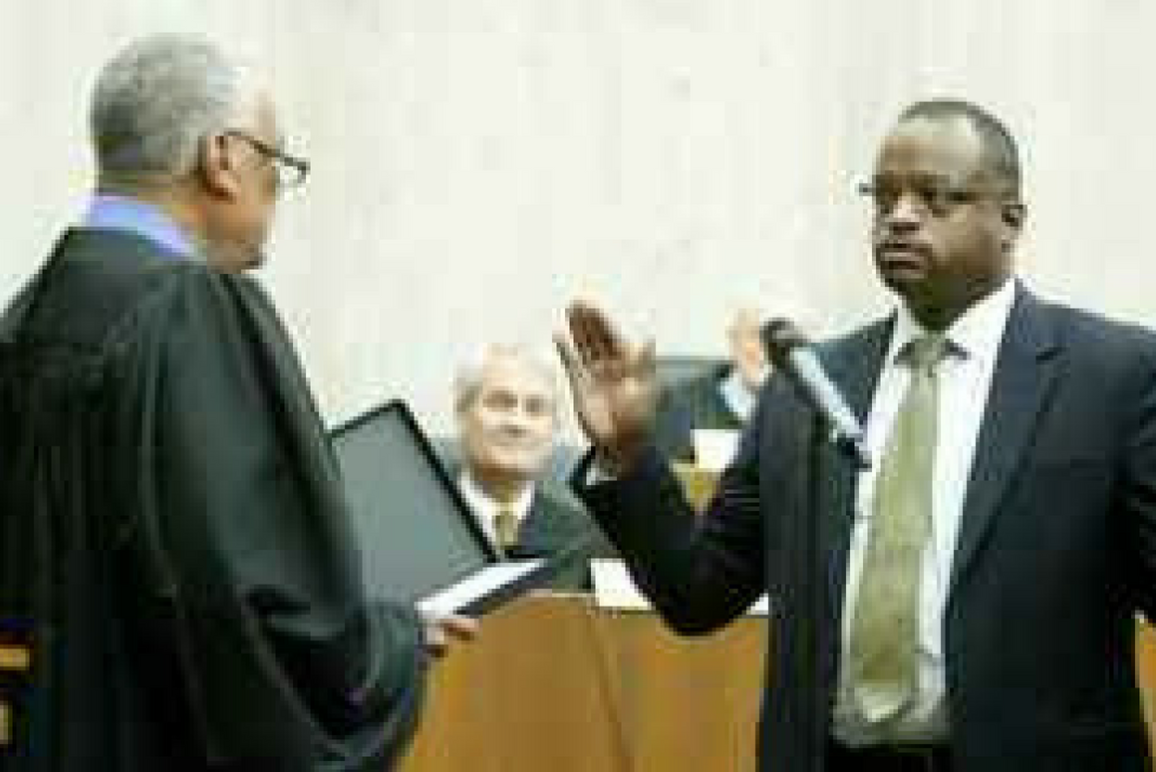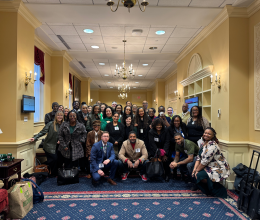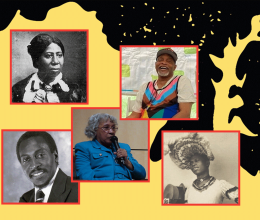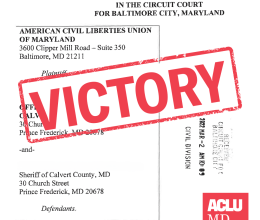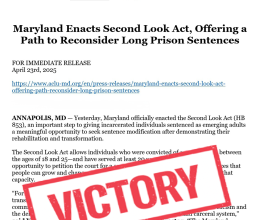
Photo from National Law Journal
The honorable Robert L. Wilkins: A Tribute
Friday, September 12, was a proud day for the ACLU of Maryland. We had the opportunity to help celebrate the swearing in of Robert L. Wilkins as a judge for the U.S. Court of Appeals for the D.C. Circuit - a man who has played many roles in the judicial system but is perhaps most famous for that of plaintiff in one of the nation's first "Driving While Black" lawsuits against racial profiling by police in the early 1990s. Susan Goering, director of the ACLU of Maryland, had the honor of sharing that important story of courage, determination, and justice at his investiture.
I first met Robert Wilkins in 1992, as an ACLU of Maryland lawyer, under circumstances that seem preposterous today, as we celebrate Robert's investiture as a federal appellate court judge. Robert contacted the ACLU because he and his family had been wrongfully stopped and searched by police along a western Maryland highway, as they traveled home through the night from a relative's funeral. For no other reason than race, this Harvard-educated, public service lawyer and his family were accused of being drug dealers by a white state trooper.
The trooper probably thought then that it was a typical traffic stop. But - as he would come to know, as everyone here today knows -- Robert Wilkins was no typical motorist and no typical man.
Robert told us his mistreatment -- which followed on the heels of the acquittal of four Los Angeles police officers in the videotaped beating of motorist Rodney King -- was another dispiriting reminder that "some police officers believe they can do anything they want." Few people who experience such mistreatment have the time, the resources, or the mental energy to fight for their rights. "So they let it go. They say ‘this is just life in America.'"
Robert was determined not to just let it go.
So it was that on Lincoln's Birthday, 1993, the ACLU of Maryland filed a federal class action lawsuit, Robert L. Wilkins, et al. v. Maryland State Police, et al., on behalf of the Wilkins family and all other African-American motorists traveling Maryland roadways. The unprecedented challenge alleged that the stop, detention, and search of the family resulted from state police use of a race-based drug courier profile that illegally targeted African-American motorists. Shortly after filing suit, we discovered smoking-gun evidence: a directive by MSP's Criminal Investigations Division warning state troopers to be on the lookout for African Americans trafficking drugs through western Maryland.
Settlement would have been easy at that point if only money were at stake. But Robert was far more concerned with systemic change than with personal monetary gain, insisting that any settlement include comprehensive training and monitoring programs to prevent future discrimination. Robert held firm through many months of trying negotiations, and finally, MSP agreed to his terms. MSP would monitor stops by creating a computer database of detailed information on all searches statewide, with reports generated to the court and the ACLU on a quarterly basis.
Never before had a police department agreed to maintain and publicly release records compiling racial statistics on traffic stops. That MSP consented to do so in order to achieve settlement is a telling indication of Robert's formidable standing as a plaintiff and an advocate.
The Wilkins case would have been significant if it had ended there. But it did not. As Robert had feared, the MSP monitoring system revealed an egregious continuing pattern of discrimination by troopers on heavily traveled Interstate 95. MSP's own internal records proved beyond a doubt what minority motorists had long claimed, but been unable to prove -- that police target people of color for highway stops.
The Wilkins lawsuit and settlement have served as a model for similar challenges around the country. Additionally, over half the states have now enacted the Wilkins monitoring system through legislation requiring record-keeping systems to track police stops -- thus giving Americans widespread access to information about the existence and scope of the problem of racial profiling for the first time.
Robert remained actively involved in the cause long after his personal stake in the litigation was resolved, selflessly devoting his talents and countless hours of his time to work on enforcement of the settlement decree, legislative advocacy, and public education efforts. He became a national spokesman on the difficulties of "Driving While Black," and succeeded like no one before him in thrusting the issue of racial profiling into the public consciousness. Robert succeeded in this -- and in a landmark court case -- because of who he is: a strong, deeply intelligent, caring and proud African-American man of unassailable integrity, who was willing to take a stand and to fight a long and difficult battle in defense of a constitutional principle.
"I wanted to make sure that this stopped happening to other people," Robert told the Baltimore Sun in 1993. "Because I don't consider myself a victim. I consider myself a warrior."
Throughout his life, Robert Wilkins has proven that he is, as he aspires to be, a warrior for justice. There could be no better model for our federal judiciary.
